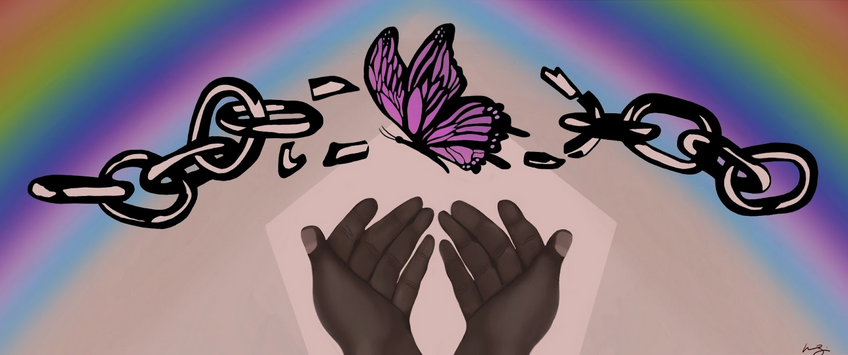Art Credit Kay Zeiss; Commentary by Krupa Bharodiya
Ashanti McClean is 33 years old and has spent over a decade living openly as a trans woman. Before her incarceration, she was already receiving gender-affirming care and has been on hormones for years. She accessed gender-affirming surgery abroad in Colombia and legally changed her name. These were hard-won acts of self-determination in a world that often refused to see her clearly. Her transition was not something she found in prison, it was something she brought with her.
Ashanti was born and raised in North Carolina. She describes her early life as good in many ways, but it eventually became defined by instability. As she grew older, securing consistent work became difficult because of her gender identity. She turned to escorting as a means of survival and remained in sex work for around 10 years. She was eventually charged in a sex trafficking case. While she recognizes the harm tied to that chapter of her life, she also believes that her identity as a trans woman influenced the severity of her sentence. The punishment, she feels, was harsher than it might have been otherwise.
Since entering the prison system, Ashanti has encountered multiple layers of harm. From threats and harassment from other incarcerated people to sexual advances and targeted neglect by correctional staff, her daily existence has often been shaped by attempts to minimize or erase her. Some incarcerated people ignore her entirely, while others treat her as if her presence alone is a problem.
Earlier in her incarceration, Ashanti asked for a transfer to a women’s facility. The committee that reviewed her request claimed that she would be safer in a men’s prison. It was a decision that prioritized institutional convenience over her safety and identity. Now, with only seven months remaining until her release, she’s no longer seeking that transfer; her focus is on what comes next.
Ashanti remains true to herself. Prison has not shaken her understanding of herself. If anything, it has deepened her resolve. She has used this time to mature and strengthen her emotional resilience. She remains affirmed in her identity, not because the system supported her, but because she carried that clarity with her from the start.
Looking ahead, Ashanti hopes to enter the advocacy space after release. She wants to work directly with other trans people who are currently or formerly incarcerated. She’s especially focused on the gaps that exist at every stage: before people are swept into the system, while they’re inside, and after they get out. She sees the need for accessible housing, employment opportunities, and affirming healthcare. More than anything, she sees how cycles of incarceration are often woven into the broader experience of being a trans person, particularly in the South.
For Ashanti, survival is not just about endurance; it’s about building something better. Her story is not simply one of hardship. It is a call to recognize the resilience of trans people in the face of systemic neglect and to imagine a world where dignity, care, and freedom are not exceptions but the norm. As Ashanti prepares for the next chapter of her life, her vision is clear: a future where trans people are supported, not punished.
Ashanti McLean smiles, posing for a photo

